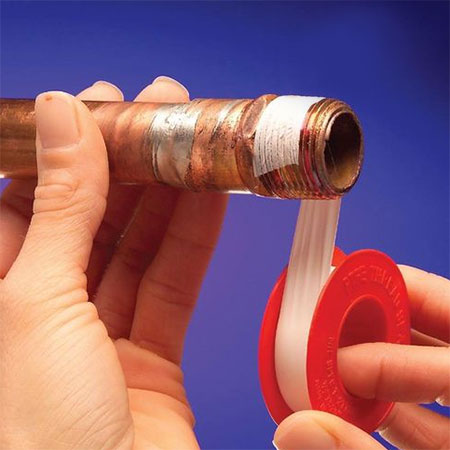JeffNC
New Member
?
They are used for different purposes so you cannot lump them together. Dope and tape are to join pipes to fittings. Putty is to seal a "clamped" joint.
But you just did lump 2 of them together.
?
They are used for different purposes so you cannot lump them together. Dope and tape are to join pipes to fittings. Putty is to seal a "clamped" joint.
Here's my opinion. I'm not a licensed plumber, but I do a fair share with bathroom remodels and other light plumbing installation and repair, and I have a background in several sciences.
Clearly the putty is a different category, and you've figured that out by now.
The issue is dope vs. tape, and frankly most of the answers even by pro plumbers make no logical sense. If you think about what's happening with the materials, using them together is pointless.
Let's say you're one of those that uses both tape and dope. So first you put your tape on, then the dope. Well, what happens when you screw that joint together is that one side of the threads has only tape touching it (the tape basically keeps the dope from touching that side), and the other side has dope touching it. They can't both be best.
Both are lubricants. Both help seal the micro gaps in the joint to resist water leaks. But they can't both be best at that job - only one or the other are. Use only the one that is best. That one will touch both sides of the threaded joint.
Personally, I think the best lubricant and the best long term sealant is pipe dope. I use this on shower arms, threaded nipples, and female PEX adapters on threaded shower valves. On any connection where there is a compression or gasket seal, it only gets in the way and gunks things up (except maybe as mentioned by Jeff Young above - then a small amount is acting strictly as a lubricant). If those leak, there is a different problem, such as a little piece of debris, crack, misalignment or other issue that needs to be corrected first.
The dope helps the threads slide across the tape.Based on some recent stuff I did my thinking is tape is going to be more helpful in closing bigger “gaps” because you can wrap it around multiple times to bulk up the male side of the pipe. Threading the female end on will at most “cut” into the tape and leave the bulk in place. With dope I feel like if you put on too much, the front end of the female pipe will just push it forward instead of filling in the gaps.
But maybe that doesn’t make any sense either. I agree that doing both seems unnecessary.
That works for me which one lubricates or seals can be argued but no leaks is what mattersTwo years ago I had to run 75 feet of 2" black steel pipe gas line in a crawl space with only 14 " of clearance. The threads on the pipe ends were dinged up, ruff and sharp. I'm also considered old school... so... with no desire to have to go back into that hell hole to check and retighten over twelve connection points to fix a leak or repair a failed inspection I wrapped the first 4 or 5 threads with a couple turns Blue Monster Gas Guard PTFE tape followed by a coating of PTFE thread sealant. (With dope alone it was a struggle to get the connections as tight as I wanted. To me anyway... the tape serves to lubricate the threads and dope to ensure a good seal. Because a little is good and a lot is better I charged the line to 75 psi and let it sit for 3 days. No drop in psi.

 www.google.com
www.google.com
Interesting take on it. I don't have any answer to that. The wetted portion of the threaded area has got to be pretty minimal, but how minimal is too much?DIY'er looking for opinions on PFAS in plumbing tape. We are repairing part of our system and trying to avoid adding carcinogens to our well and bodies. I realize that leaking joints are a problem but I would really like to have the cleanest water I can. I've taped all the joints to the tee on the pressure tank but am debating taping the rest of the joints. We are using a Shurflo 5050 positive displacement pump because we have a small solar system and it works well with batteries. It's 55 PSI Switch/Bypass, 5 GPM.
I don't need to create headaches for myself but I'm am trying to be proactive.

Plumbing tape used on water pipes is made with PFAS
Read the full article by Erin Rhoda (Bangor Daily News) “Homeowners, water district operators and plumbers frequently wrap water pipes with Teflon plumber’s tape, which fills the spaces betwe…www.google.com
I had not heard of this.DIY'er looking for opinions on PFAS in plumbing tape.
I had not heard of this.
It seems to me that this is a good reason for buying good PTFE tape, figuring that the cheapest could be made from anything that looked right. The Oatey pink looks good to me, but there are other good name brand tapes.
 chemsec.org
chemsec.org
PFAS is that a typo ? PTFE a lot of good ones out there . Cancer ? I have no knowledge on that had it once couple years ago hoping the chemo did the trick

The issue have been when these companies dump it into the water or runoff from manufacturers. Not related to using tape on water pipe. More like the Teflon coated pans that you scrape up and eat from.
Nearly HALF of the tap water in the US laced with 'forever chemicals'
Almost half of all tap water sources in the US are laced with 'forever chemicals' that have been linked to fertility problems, liver damage, and more, a new government study found.www.dailymail.co.uk
Experts said the findings were 'frightening' given the scale of the problem and the link between the toxins and serious health conditions like cancer, infertility, birth defects and hormone issues
I understand what you are saying, in my area it's been sludge applied to agricultural fields contaminating wells and ground water. I realize the tape is a small contact point, however I'm trying to reduce any potential contamination due to existing health problems.The tape doesn't contaminate the water. The wetted surface of a joint that has been taped is going to be beyond tiny, if any at all. Then you'd have to break the surface down into the water. This isn't realistic.
The issue have been when these companies dump it into the water or runoff from manufacturers. Not related to using tape on water pipe. More like the Teflon coated pans that you scrape up and eat from.
I am not a plumber. I have heard old plumbers say they used to use soap to lubricate the threads back in the day. I don’t know if that works or not. In my house (where I have to live with the consequences of any leaks) I use tape then dope for anything that is pressurized and just tape for anything that is not.I understand what you are saying, in my area it's been sludge applied to agricultural fields contaminating wells and ground water. I realize the tape is a small contact point, however I'm trying to reduce any potential contamination due to existing health problems.
My original question was really can I make threaded unions without tape or dope without them leaking, not to ignite controversy about PTFE and PFAS.
And for what it's worth - we don't use Teflon pans for just that reason.
This is awkward, but...
It looks like you're using an ad blocker. We get it, but (1) terrylove.com can't live without ads, and (2) ad blockers can cause issues with videos and comments. If you'd like to support the site, please allow ads.
If any particular ad is your REASON for blocking ads, please let us know. We might be able to do something about it. Thanks.